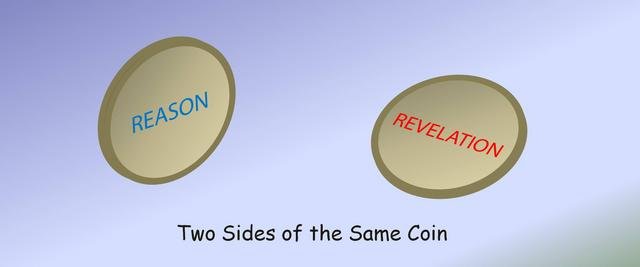Reason and Revelation
In this postmodern era of exaggerated deference to REASON, relatively few of us have actually taken the time to find out what reason is. Therefore the flip side of the coin has been largely ignored. And what is it that goes hand in hand with reason, inseparable from it, each driving the other forward? It is REVELATION.
Revelation is ‘mysterious’ in that it is difficult to explain in reasonable terms. However revelation is ubiquitous in nature so there should be no surprise. The flower reveals the essence of a plant, for example. Or a culture of germs grown in a lab reveals the identity of a bacterium. Revelation can also be understood as an answer to a question; it is the specific process that leads one to the other.
When we ask a question the intention behind it is of utmost significance. If we think we already know the answer then it is not really a question, we are merely seeking affirmation. When we ask a question sincerely it is a humble acceptance that we are stuck; and by necessity there must to some degree be a crisis situation. Without a sense of crisis we are simply indulging in idle curiosity, and revelation will not be forthcoming.
With practice, one can develop a knack for discovering and articulating the right questions. One knows they are the right questions because they carry the required sense of urgency; they have subjective importance. Of course if there are no problems to solve then life is good! But there are times when we might experience emotional turmoil in our personal lives for example, and it is traumatic because we cannot see a way out, and we feel trapped. It is from this state of discomfort that the question naturally arises: how can I extricate myself from this conflict?
Another example might be a scientist who becomes frustrated in his efforts to understand a technical issue; he is struggling to reconcile the differences between his theory and test results. By identifying with this conflict he suffers for it, and crucially it is in this suffering that he might eventually solve it.
In ‘occult’ terminology this is where an egregore comes in. An egregore is a thought form that exists just like a life form, but instead of its seed germinating in physical soil it germinates in ‘psychological soil’. And the seed must die before it can sprout, and it remains buried in darkness for several days before finally breaking above ground and into the light.
When the new seed germinates in the right conditions, nature will take care of the rest. At this stage it is better for it to be left alone. It is the same with the thought form. For a few days the question may weigh heavily upon the individual. After this initial period of attention however the process will start to self adjust.
While one then goes about one’s regular business each day, the thought form gradually matures as an independent entity. This takes place mostly out of sight. The essence of the problem, or the question, was imbued originally within the seed; and like all seeds the secrets remain hidden or occulted. It requires the patient nurturing of the plant over time for these secrets to be revealed. And when the time is right the thought form will ripen and spill its secrets in full view.
It is in the spilling of the fruit that questions reveal their answers through flashes of imagination. For straight forward matters the process might only take a few minutes; for more complex issues possibly days or even weeks. It is this mysterious act of revelation that sustains human reason, and vice versa. The scientific method absolutely depends on it, although it will arrogantly deny it, asserting that the phenomenon of hypothesis, which is itself revelation, is simply part of the scientific method.
A thought form may instead be initiated emotionally through desire and not by reason, as is the best practice. This is generally a more grotesque thought form that will struggle to fulfill its destiny. Like a weed, it can manifest as a psychological disorder within the individual who risks becoming consumed by his own creation. The thought form continually tries to develop but it cannot come to fruition, particularly if clarity was absent during inception. Then there will be no forthcoming revelation that frees the thought form from service. Like a roaming demonic entity its existence is unnaturally prolonged and devoid of inherent vitality.
It is prudent therefore for the individual to tend closely to his own garden and watch his own thoughts. Belief systems and any unreasonable desire for personal gain can lead to pathological mental states that may not even become apparent till later in life. The revelation of conflict however should be reason enough to desist from pandering to these flawed thought forms, and thereby cut off their chaotic influence in the world.
To conclude then, the dynamic process of reason and revelation operates like an alternator circuit that drives the thinking process. Seed to flower, and flower to seed, and so on. There may be any number of concurrent thought forms in different stages of development. What is lacking however in these postmodern times is faith in nature to reveal the solution to any problem if given time and space to do so.
Faith in nature is not the same as faith in God, in that nature is the observable here and now, and God is an idea of an invisible deity. We should be careful that we do not feed our attention into the super-egregore of an off-planet deity called ‘God’; or if we do then we know what we are doing! Gods and demons certainly exist, but only because we have created them, and are continuing to support them. Nature meanwhile is the extraordinary means through which these elemental beings are created.

